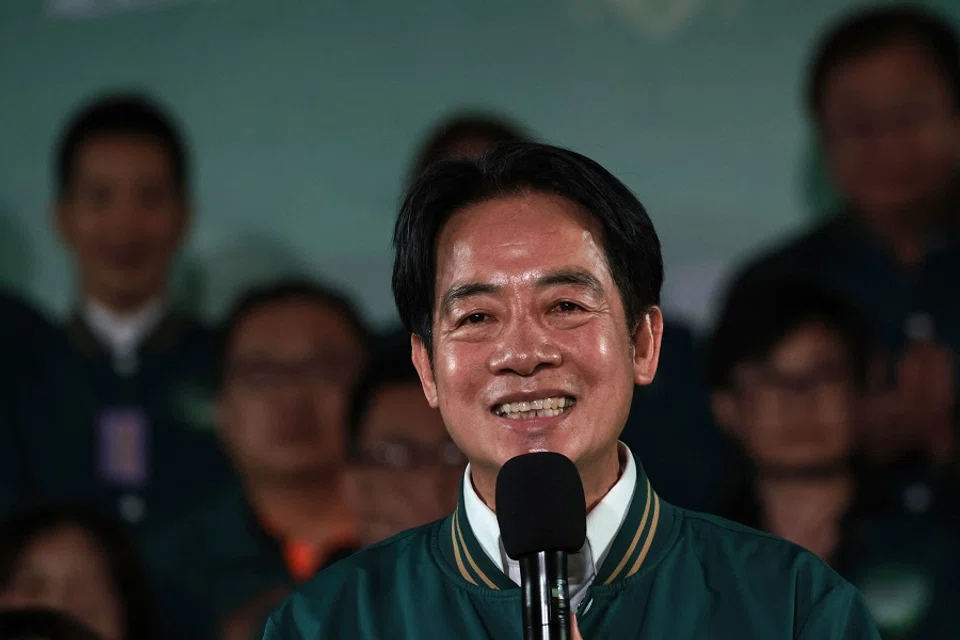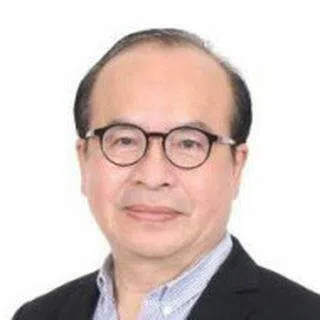Taiwanese commentator: How William Lai can be a good Taiwan president
With William Lai as Taiwan's president-elect, commentator Chen Kuohsiang delves into what the DPP needs to do to cope with losing its parliamentary majority, navigate cross-strait relations and win over the Taiwanese people.

The results of the Taiwan presidential election are out, with "Taiwan independence" advocate William Lai Ching-te becoming the president-elect. However, winning with just 40% of the vote, he is set to become a true "minority president".
Moreover, no party won an absolute majority of seats in the Legislative Yuan, with the ruling Democratic Progressive Party (DPP) gaining a minority of seats, the Kuomintang (KMT) winning the most seats, and the Taiwan People's Party (TPP) becoming a key minority. This "triple minority" situation will pose a challenge in political manoeuvrings within the legislature.
Challenges in Legislative Yuan
To observers outside Taiwan, 60% of voters wanted the DPP to be "taken off the shelf" before the elections; with Lai only securing 40% of votes, how can he represent mainstream public opinion? At the same time, with mainland China harshly criticising Lai's stance on Taiwan independence, coupled with growing economic, trade and military pressure, how can Lai ease tense cross-strait relations if he refuses to compromise?
To the people of Taiwan, if the ruling party is not backed by an absolute majority in the Legislative Yuan, and the executive and legislative branches are going to be controlled by different political parties, then policies, legislations and budgets will certainly be affected.
If compromises cannot be reached, that is if the ruling party fails to join hands with the third-largest party in the Legislative Yuan and fails to make concessions to the KMT which is now the largest opposition party, there will never be peace in the Legislative Yuan and smooth governance.
Mainland China has long defined Lai as an out-and-out "worker for Taiwan independence", and warned more than once that such people were "troublemakers" who would only push Taiwan to the brink of war. Lai's past actions have proven time after time that his leanings towards Taiwan independence are more extreme than outgoing Taiwan President Tsai Ing-wen's. However, to dispel any doubts about his tendencies, Lai has claimed that he will follow in the footsteps of Tsai.

However, mainland China is not buying it, with the Taiwan Affairs Office (TAO) clearly stating that the so-called "Tsai Ing-wen path" is the path that advocates for Taiwan independence and brings confrontation and damage to Taiwan. Not only that, following such a path would "keep pushing Taiwan further away from peace and prosperity, and closer to war and recession". With Lai set to take office, the shadow of war in the Taiwan Strait is growing thicker.
The most convenient way to reach a compromise is to suspend the independence clause in the 1991 party charter in his capacity as DPP chairman.
Compromises needed
The US is also doubtful about Lai, as it is aware that Lai's election could trigger a Taiwan Strait crisis. Just one day after the election, an unofficial delegation from the White House arrived in Taiwan to meet the President-elect in an attempt to manage tense cross-strait relations that could escalate.
Lai has always been a staunch advocate of Taiwan independence, and if he is unable to suitably compromise, it could be difficult to stabilise cross-strait relations and keep them from spiralling out of control.
The most convenient way to reach a compromise is to suspend the independence clause in the 1991 party charter in his capacity as DPP chairman. On 30 November 2023, three heavyweight US academics jointly wrote a commentary in Foreign Affairs, urging Lai to consider "suspend[ing] the independence clause in the 1991 party charter" if he is elected to give more weight and credibility to the commitment of maintaining the status quo on both sides of the Taiwan Strait.
However, the huge mountain towering before Lai cannot be overcome with casual remarks and he would need to make clear his stance on the "one China" principle.

Some mainland China academics studying Taiwan also think that if Lai declares the suspension of the independence clause in the 1991 party charter in his capacity as DPP chairman, or even abolishes the clause in the course of his four year term, it would help ease potential cross-strait tensions.
In his victory speech, Lai said that he "will replace containment with exchanges and confrontation with dialogue" to maintain peace and stability in the Taiwan Strait and achieve peace and co-prosperity. But to Beijing, this is just empty talk and far from enough, and it will not respond with any friendliness.
However, the huge mountain towering before Lai cannot be overcome with casual remarks and he would need to make clear his stance on the "one China" principle.
Leaving aside his past comments, after Lai takes office as Taiwan president, he should see things with the vision of a president and adjust his position. In his New Year's message, TAO director Song Tao mentioned that "all good principles should adapt to changing times to remain relevant" - it is never too late to do something good, and one should act according to the times and circumstances.

Cross-strait relations are now at an important crossroads, and subjective thinking should be dropped, in order to see the objective reality and make the necessary compromises, to make clear judgements and the right choices.
Similarly, Lai needs to compromise on internal affairs. The DPP has lost its parliament majority, and a minority DPP government in the Legislative Yuan does not allow for a complete rule; it must respect the status and opinions of the two major opposition parties, and try to build a consensus, or else the government will be in limbo.
Lai secured less than half of the votes in the presidential elections, while the DPP is six seats short of a majority in the Legislative Yuan. That it failed to gain both the presidential and parliamentary majority shows that the DPP did not receive the mandate of the people.
As Taiwan does not follow the parliamentary or dual-executive system, the president of the Legislative Yuan is not necessarily the leader of the largest party in the Legislative Yuan or the largest political alliance. Such a constitutional model runs counter to the basic concept of democratic politics based on majority opinions.
If he wants to be a good president, Lai needs to be "everyone's president", whether in terms of self-positioning, distribution of power, relations with the opposition, or resource allocation.
The bearing of a president of the people
If Lai assumes the presidency in a monopolistic manner with no regard for the opposition party that has more seats in the Legislative Yuan, and only appoints people and implements policies in a party-centric way to the point of clashing with the opposition even when there is strong backlash and interference, he is destined to become a failed president leading Taiwan down a path of failure.

If he wants to be a good president, Lai needs to be "everyone's president", whether in terms of self-positioning, distribution of power, relations with the opposition, or resource allocation. He must have the courage to compromise with the opposition and negotiate consensus. In terms of mentality, he must put Taiwan's interest and the people's well-being first, while putting aside the party's stance.
Appointments must be based on meritocracy, transcending political party boundaries; policies must go beyond the political stance and advocates of his own party, free of ideological constraints and formulated with an open mind and vision. The process of forming policies, bills and budgets must be fully communicated with the opposition parties, with their views respected and taken in. The same should apply to civil organisations.
In terms of governance, Lai must be humble, putting aside his party's interests and concerns and act as "everyone's president" instead of president of the DPP. He could then gather the wisdom of various parties and people, get help from many avenues, run an effective government and win the support of the people. Otherwise, his governance will face interference and resistance, with no results in the end.
Compromise is a necessary tool of governance.

Politics is the art of possibilities, and compromise is a concrete expression of democratic values. The actions of government agencies cannot be dictated by the ideology of a single political party - this should be so when there is a majority rule and a majority in the parliament, and even more so when both are in the minority.
Compromise is a necessary tool of governance. When Confucius said he avoided four things: conjecture, arbitrariness, stubbornness, and egotism, it was in fact the manifestation of compromise. Government leaders cannot act arbitrarily on the basis of their own opinions, cannot be absolutely affirmative or absolutely negative about anyone or anything, and cannot be obstinate, self-righteous, or self-serving.
A willingness to compromise makes political leaders more respectful of their opponents and more flexible with their beliefs and policies - this is how governments pursue prosperity and avoid calamity, and also an indispensable quality of successful governments and political parties.
This article was first published in Lianhe Zaobao as "赖清德该如何当好台湾总统".



![[Photos] Fact versus fiction: The portrayal of WWII anti-Japanese martyrs in Taiwan](https://cassette.sphdigital.com.sg/image/thinkchina/3494f8bd481870f7c65b881fd21a3fd733f573f23232376e39c532a2c7593cbc)

